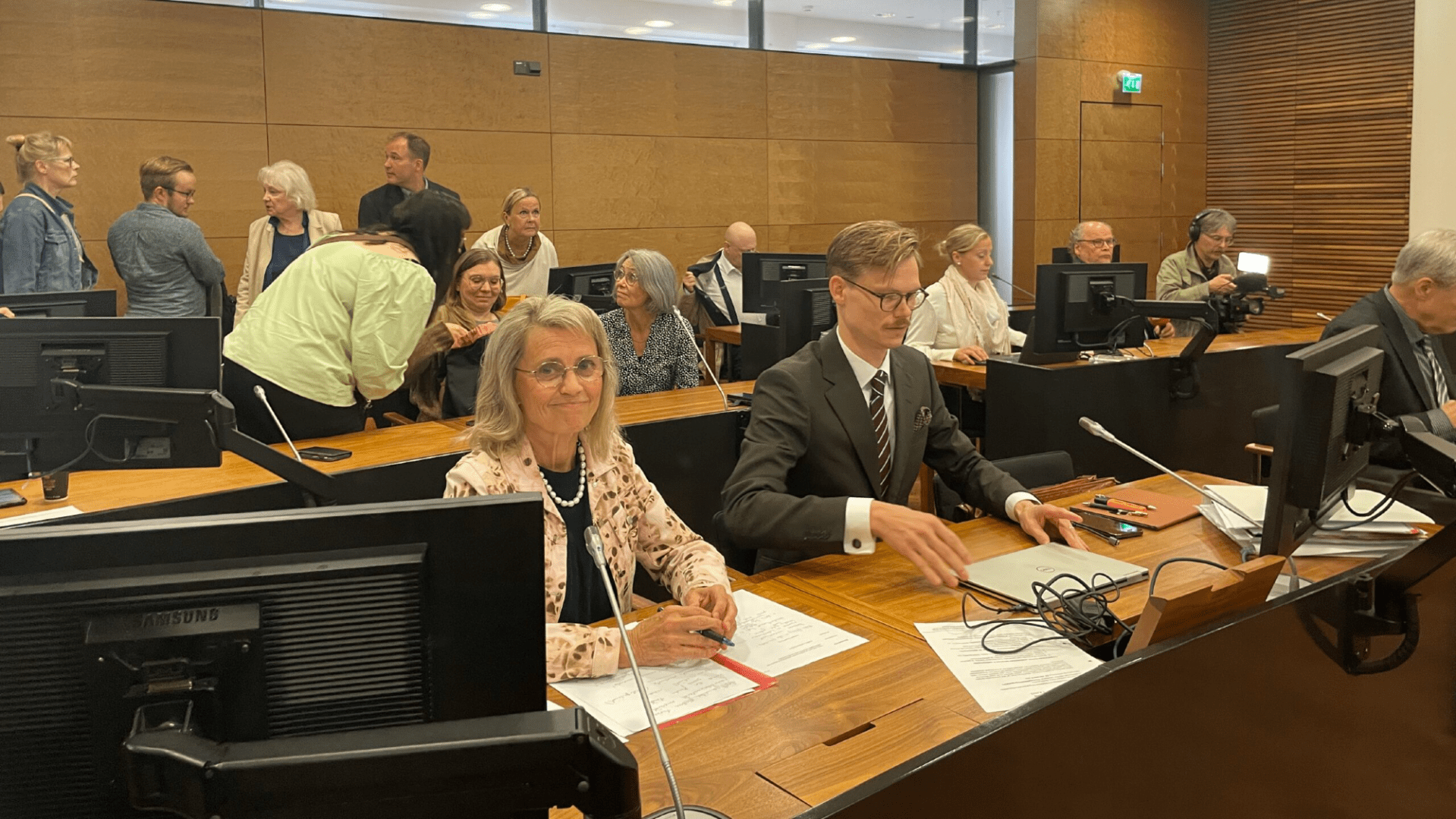A Finnish court ruled in favor of the free speech of a member of Parliament and a Lutheran bishop on Tuesday morning, affirming they have the legal right to say that homosexual acts are sin and marriage should be between a man and a woman.
The ruling was unanimous, upholding a lower court decision for last year, which was also unanimous.
“I’m overjoyed,” said Päivi Räsänen, a Christian Democrat who has served in Parliament for 28 years. “This is a tremendous victory for us but also for everyone concerned with the protection of fundamental freedoms. … No one should be punished for peacefully expressing their faith.”
Juhana Pohjola, bishop of the conservative and confessional Evangelical Lutheran Mission church, said he and his family stopped and read Psalm 103 when they received the verdict: “Praise the Lord, my soul; all my inmost being, praise his holy name. Praise the Lord, my soul, and forget not all his benefits” (vv. 1–2).
Pohjola was charged with hate speech for publication of Räsänen’s 23-page booklet, Male and Female He Created Them, in 2004. The text was part of the church’s catechetical series of Christian teachings on important issues.
Räsänen was charged under the criminal hate crime statute for the booklet as well as for a tweet condemning the mainline Lutheran church’s support for a Pride event in 2019 and a follow-up radio interview where she said that, according to the Bible, “homosexual acts” are “sin and shame.”
According to prosecutors, these statements were not only offensive but likely to incite hate and violence against LGBT people.
The Office of the Prosecutor General argued such speech is not protected because it causes “intolerance, contempt, and hatred” and thus endangers lives.
More than 70 percent of Finns support same-sex marriage, which has been legal in the country since 2017. A majority of the members of the Evangelical Lutheran Church of Finland, the mainstream church that Pohjola’s denomination broke from in the early 2000s, also hold that position. The church does not currently perform same-sex marriages, but 54 percent would like that to change.
Many in Finland see protection of LGBT people as the most critical civil rights issue of the day.
Prosecutor Anu Mantila ran for office on the promise to do more to protect LGBT people. Her case against Räsänen and Pohjola has received lots of national attention and wide support from Finns.
“Offensive speech has a damaging effect on people,” she argued before the court. “If you put all the statements together, it is clear that they are derogatory towards homosexuals. Condemning homosexual acts condemns homosexuals as human beings.”
Mantila argued religious freedom—which is enshrined in Finnish law and international law, which Finland recognizes—does not protect every reading of the Bible. Some interpretations, according to the prosecutor, should be punishable by law.
“You can’t say anything under the guise of religion,” Mantila said. “You can cite the Bible, but it is Räsänen’s interpretation and opinion about the Bible verses that are criminal.”
All three judges rejected her arguments.
“There must be an overriding social reason for interfering with and restricting freedom of expression,” the court said. “There is no reason to alter the final result of the District Court’s judgment.”
In 2022 the lower court ruled that “it is not for the District Court to interpret biblical concepts.”
The legal team defending Räsenän and Pohjola said in an online press conference that they were celebrating “the fantastic verdict.”
Paul Coleman, the executive director of Alliance Defending Freedom International, described the ruling as a monumental victory.
“In a free and democratic society, all should be allowed to share their beliefs without fear of censorship,” he said. “Criminalizing speech through so-called ‘hate-speech’ laws shuts down important public debates and poses a grave threat to our democracies. We are relieved to see courts enforce the rule of law when state authorities overstep by seeking to penalize and censor statements that they dislike.”
Räsänen and Pohjola both said they didn’t seek this legal conflict but were committed to seeing it to the end.
“I will not apologize for what apostle Paul has stated in the Book of Romans,” Räsänen said. “I decided whatever comes, whatever the conclusion or the result will be, I will not give up.”
Pohjola said when he was first called into the local police station for questioning, officers told him the case would go away if he took Male and Female He Created Them off the internet. But he refused.
“To me, this is not only a cultural and legal battle but a spiritual battle,” he said. “This is my calling as a Christian, as a pastor: to guard the faith and teach it publicly and carry the cross.”
Many in the Evangelical Lutheran Mission were relieved by the ruling, though. Pohjola said ministers texted him when they learned of the ruling on the news, with messages like, “We are so happy that our bishop is not labeled as a criminal.”
There was a real fear, he explained, that the small Lutheran denomination might be branded “a criminal group, with a criminal agenda.” They’ve been reminded that speaking publicly can come at a cost.
“We cannot take freedom of speech and religion for granted. We have to defend it and use it,” Pohjola said.
The case may not be over, however. Government prosecutors can file an appeal with the Supreme Court. The top court in Finland takes, on average, about 6 percent of cases.











